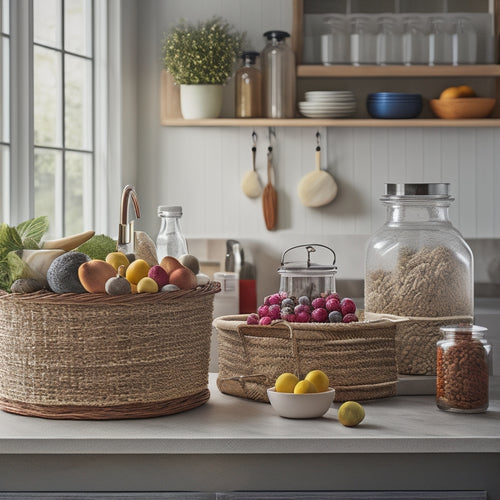
Newspaper Headline: Fresh Produce Storage Hacks Unveiled
Share
As I prioritize fresh, healthy food on-the-go, I've learned it's all about clever storage hacks. In my tiny kitchen, I utilize simple strategies like designating specific bins for different produce, storing leafy greens in breathable containers, and separating fruits and veggies to prevent rapid ripening. I've picked up expert tips on kitchen organization and DIY preservation techniques like canning, freezing, and dehydrating. By implementing these secrets, I've mastered the art of keeping my produce fresh for a longer period. Now, I'm excited to share my favorite hacks with you - and trust me, there's more where that came from!
Key Takeaways
• Utilize breathable containers and bins to store produce, separating fruits and veggies to prevent rapid ripening due to ethylene gas.
• Designate specific storage spaces in your kitchen, like the crisper drawer, to maintain optimal freshness and prevent moisture buildup.
• Implement DIY preservation techniques like canning, freezing, and dehydrating to extend the freshness of fruits and vegetables.
• Prioritize refrigerator organization, storing high-moisture items in breathable containers and keeping the crisper drawer clean and organized.
• Purchase fresh produce from farm stands and engage in meal planning to ensure you use up ripe ingredients before they spoil.
Hit the Road With Fresh Food
As I set out on our epic family RV journey from Portland to Seattle, with stops at iconic destinations in between, I'm determined to prioritize fresh, healthy food despite the challenges of cooking in a tiny kitchen without fancy appliances.
To make this happen, I've been busy with RV meal planning, thinking creatively about how to prepare nutritious meals on the go. Food preservation techniques like canning, freezing, and dehydrating will be essential in keeping our food fresh and safe to eat.
I'm excited to share my experiences and tips with you as we hit the road, and I hope to inspire you to prioritize fresh food on your own adventures. Stay tuned for updates from the road!
Mastering Produce Storage Secrets
My tiny RV kitchen may not have all the bells and whistles, but with a few simple strategies, I can keep our fresh produce fresh for days to come.
When we hit the road, I always make a beeline for farm stand finds, loading up on seasonal goodies. To keep them fresh, I prioritize kitchen organization.
I designate specific bins and containers for each type of produce, making sure they're stored in the right conditions. For example, I keep leafy greens in a breathable container and store them in the crisper drawer.
Fresh Food Hacks on the Go
I've developed a few clever tricks to keep our farm stand finds fresh and healthy, even in the confines of our tiny RV kitchen. When it comes to road trip meal planning, I prioritize simplicity and flexibility.
I prep ingredients in advance, like chopping veggies and marinating proteins, to make meal prep a breeze. In our compact kitchen, organization is key. I utilize every inch of space, storing items like spices and oils in easy-to-reach spots.
Storage Tips From the Experts
To take my produce storage game to the next level, I turned to the experts, including Renee Boyer and Julie McKinney at the Virginia Cooperative Extension, who shared their knowledge on how to keep fruits and veggies fresh for a longer period.
Their expert advice emphasized the importance of kitchen organization, suggesting that I designate a specific area for storing produce. They also recommended storing fruits and veggies separately, as some release ethylene gas that can cause others to ripen quickly.
Maximizing Freshness at Home
By implementing a few simple strategies in my daily routine, I can greatly extend the freshness of my fruits and vegetables at home. One key approach is DIY preservation, which involves canning, freezing, or dehydrating produce to enjoy year-round.
I also prioritize refrigerator organization, ensuring that my fruits and veggies are stored in a way that promotes airflow and prevents moisture buildup. This includes keeping high-moisture items like berries and leafy greens in breathable containers, and storing them in the crisper drawer.
Frequently Asked Questions
How Do You Wash and Dry Delicate Fruits Like Berries and Grapes?
Ugh, I'm no berry whisperer, but I've learned to handle delicate fruits like, well, fragile egos. I wash them gently, pat dry with a clean cloth, and consume quickly or refrigerate to prevent moldy mayhem.
Can I Store Cut Fruits and Veggies in Airtight Containers?
I store cut fruits and veggies in airtight containers to maintain freshness, controlling moisture with paper towels or cloth to absorb excess, and I label them with dates to guarantee safe consumption within a few days.
Are There Specific Storage Tips for Exotic Fruits Like Durians and Jackfruits?
When I stored durian on my RV trip, I learned that exotic fruits like durian and jackfruit require unique storage tips; I preserve their freshness by keeping them at ideal conditions, like refrigerating durian at 32°F to prevent spoilage.
How Long Do Frozen Fruits and Veggies Retain Their Nutritional Value?
"I've found that frozen fruits and veggies generally retain their nutritional value for 8-12 months, but it depends on freezing duration and storage methods. Even then, cooking methods like steaming can help preserve nutrients better than boiling or frying."
Can I Use the Same Storage Methods for Organic and Non-Organic Produce?
"As I fuel up for my epic road trip, I wonder: can I store organic and non-organic produce the same way? The answer is, not quite - organic produce requires gentler handling and storage to preserve its natural goodness."
Related Posts
-

Sliding Pantry Organizers With Tiered Racks
Sliding pantry organizers with tiered racks optimize your pantry space and enhance accessibility. These organizers cr...
-

Over-The-Door Kitchen Storage for Apartment Living
Over-the-door kitchen storage is a smart solution for apartment living, allowing you to maximize vertical space while...
-

Countertop Storage Ideas for Busy Homeowners
As a busy homeowner, optimizing your kitchen countertop is essential for efficiency and style. Consider using vertica...


